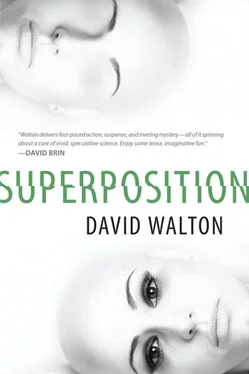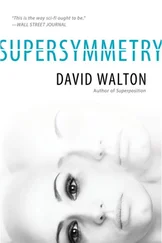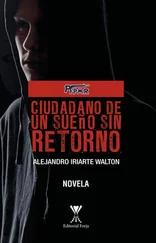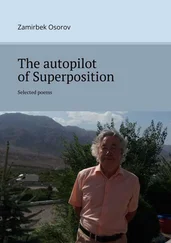David Walton
SUPERPOSITION
To Miriam
because second is best
“Our imagination is stretched to the utmost, not, as in fiction, to imagine things which are not really there, but just to comprehend those things which are there.”
—Richard Feynman, 1965 Winner of the Nobel Prize in Physics
UP-SPIN
I should have known better than to let him in. Brian Vanderhall showed up on my doorstep in the falling snow wearing flip-flops, track shorts, and an old MIT T-shirt, the breath steaming from his mouth in little white gusts. It would have saved me a lot of trouble if I had slammed the door in his face, never mind the cold. Instead, like a fool, I stepped aside.
I had been in the basement working the heavy bag when the doorbell rang. A vee of sweat darkened my gray, sleeveless shirt, and my arms were slick with sweat.
“Jacob Kelley,” he said. “Looking like a Neanderthal, as always.”
“And you’re as charming as ever,” I said. “Where’s your coat?”
He gave me a weak smile. “Close the door.”
I peered out and saw nothing but snow and darkness. “Everything okay?”
“Just close it, will you?”
Brian Vanderhall had been a friend since college, probably my best friend through graduate school and all the drama surrounding our careers at the New Jersey Super Collider. He hadn’t always been the most loyal of friends, and there were reasons I’d let him slide out of my life. Finding him unexpectedly at the door like that, I thought he would try to pull me into some kind of messy personal or financial problem, but I wasn’t expecting disaster. I guess we never do.
Brian stamped snow off his flip-flops and kicked them into a corner. A blast of frigid air invaded the room’s fireplace warmth as I pushed the door shut and relocked it. His face and hands were chapped red, and several days’ worth of stubble covered his face. It had been two years since I had seen him in person, and he looked different, though I wasn’t sure why. His hair was a bit longer, I thought, and the glasses might have been a new pair. Maybe he just looked older.
We climbed the three steps from the landing to the living room, where my daughter Claire sat curled by the fire doing her math homework, her blond hair spreading like a sunrise over her shoulders. I gave her a quick kiss on the forehead, and we rounded the corner into our kitchen.
The kitchen was the room that had sold Elena and me on this house. It was spacious and modern, with long countertops and a butcher-block island. Elena soon had us around the breakfast table with hot mugs: coffee for her and Brian and tea for me. I could hear Alessandra practicing her trumpet upstairs.
Brian cupped his hands around his mug and inhaled the steam. “Thank you,” he said. “Really, I can’t say how much.”
Elena and I traded glances. She was small, athletic, and wore jeans and a health club sweatshirt. Her looks, as far as I was concerned, had only improved since she was twenty-two, when I’d spotted her running ahead of me in the Philadelphia marathon and I’d finished in record time just to keep her in sight.
“How are things at the NJSC?” she asked.
“Oh, you know, same old,” Brian said distractedly. “Richardson is an ass, as always.” He looked at me. “Things were never right after you left.”
“Things were never right when I was there, either,” I said. The New Jersey Super Collider was the largest particle accelerator in the world, built under the Pine Barrens at Lakehurst, not far from Princeton. Massively expensive, its construction far over budget, it had been condemned by many as the “Big Dig” of our generation, the protests compounded by the environmentalist outcry about long-term radioactive effects on the pine forest ecology. Despite all the objections, Richardson had managed to push it to completion. Once it was operational, the political feeding frenzy had increased, only instead of fighting about whether the accelerator should be built, they fought over who should be allowed to use it. There were some aspects of working there that I dearly missed. There were others that I didn’t miss at all.
“I don’t understand why you left,” Brian said. “Nobody does. You’ve got a PhD from Princeton. You’re a published physicist, top of your game, the next Wheeler maybe. How could you give it up for…” He waved his hand vaguely around the kitchen.
“I’m teaching physics at Swarthmore College,” I said. “I love it there. I have some bright kids. And there’s no politics, no squabbling over experiment time, no need to prove to strangers that my work is worthwhile in order to keep doing it.”
That had been the last straw for me, when the appearance of our research to the outside world overcame the commitment to genuine discovery. There was such a pressure for our multibillion-dollar investment to produce new results that the value of the science itself was jeopardized. For the first time since Congress had canceled the Superconducting Super Collider in Texas in 1993, the United States was on the leading edge of particle physics. We could have finally overcome the infamous American nearsightedness where science was concerned. Instead, we spent so much effort trying to prove the value of the NJSC to taxpayers that we hardly got any value from it at all.
“You could at least have taught at Princeton,” Brian said. “They would have found a place for you.”
“I left to avoid politics,” I said.
Brian shook his head. “You would have been something special. Remembered by the history books. And you threw it all away.”
I sipped at my tea to mask the bunching in my muscles. “Just because a man is a talented pianist doesn’t mean he has to choose music as his career,” I said. “Just because a girl is a talented ice skater doesn’t force her to choose the life of an Olympian.” It felt like we were picking up the conversation right where we’d left it two years before. I was tired of it already.
He sipped his coffee, made a face. “That brilliant mind of yours is squandered helping mediocre students get a few science credits.”
I half stood, my hands flat on the table, scraping the chair against the tile floor. Elena put a quick hand on my arm. “Look,” I said. “Did you come here just to insult me, or did you have some other purpose?”
“Sorry, sorry,” he said. “I know. Old habits and all that.” He lifted the mug back to his mouth, but his hand shook, and some of the hot coffee spilled over the edge. He slammed the mug down, slopping more on the table, shouted a garbled expletive, and sucked at his hand.
“Here,” Elena said. She ran a dish towel under cool water and handed it to him. He wrapped it around his hand, while I used another cloth to wipe away the coffee mess.
I realized then why Brian looked so different. He was scared. Not stressed—I had seen that before, when he had money problems or feared that one of the women in his life would find out what he was doing with the other. This was different. He was stealing glances at the windows and startling at sudden noises. He was like a squirrel on the road, poised to bolt to safety the moment he was sure which way the danger was coming from.
“Spit it out,” I said. “What’s wrong?”
“What do you mean?”
“You’ve never made a social call in your life. What do you want from us?”
He brushed a stray lock of hair out of his eyes, which promptly fell back down again. “I’m in a bit of trouble,” he said.
Читать дальше













